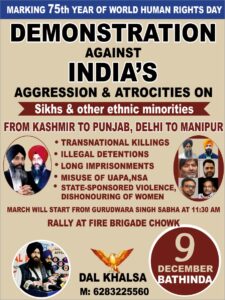Dal Khalsa seeks Abolition of Death Penalty and Political Prisoners Release
In a significant development aimed at highlighting human rights abuses in India, the Dal Khalsa has called for the abolition of the death penalty and the release of Sikh political prisoners. On the eve of the 75th World Human Rights Day, the Dal Khalsa is planning a rally and march in Bhatinda to raise awareness about these pressing issues. WSN reports.
![In a significant development aimed at highlighting human rights abuses in India, the Dal Khalsa has called for the abolition of the death penalty and the release of Sikh political prisoners. On the eve of the 75th World Human Rights Day, the Dal Khalsa is planning a rally and march in Bhatinda to raise awareness about these pressing issues. WSN reports. Dal Khalsa’s move comes amidst escalating concerns over the treatment of political dissidents and minority communities in India. The […]](https://www.theworldsikhnews.com/wp-content/uploads/2023/12/Dal-Khalsa-to-observe-Human-Rights-Day-360x388.jpg)
Dal Khalsa’s move comes amidst escalating concerns over the treatment of political dissidents and minority communities in India. The group has also sought intervention from the United Nations to persuade India to join other nations that have already abolished capital punishment.
Despite their peaceful intent, WSN has learned that the Punjab police and district administration have indicated their reluctance to allow the commemoration of Human Rights Day by the Dal Khalsa. This move only underscores the need for observation of Human Rights Day in the Punjab.
Paramjit Singh Mand, the young spokesperson for the Dal Khalsa, emphasized that the abolition of the death penalty could be a significant first step for India to align with global human rights standards. He highlighted that most countries have moved away from capital punishment. He mentioned that “life and death are in God’s hands and human fallibility by judges and irreversibility of wrong judgements has been proven to be major reasons for abolition worldwide. With a sense of pride, he asserted that “in the 40-year rule of Maharaja Ranjit Singh in Punjab, nobody was awarded the death penalty.”
“This would be the best way to resolve the case of release of political prisoners sentenced to death,” emphasized Mand.
 Dal Khalsa has also reached out to international human rights organizations like Amnesty International and Human Rights Watch, urging them to make renewed efforts to assess the human rights situation in regions like Punjab and Kashmir. The closure of Amnesty International’s Indian Section, attributed to the indifference of the Indian establishment, has raised concerns about the state of human rights advocacy in the country.
Dal Khalsa has also reached out to international human rights organizations like Amnesty International and Human Rights Watch, urging them to make renewed efforts to assess the human rights situation in regions like Punjab and Kashmir. The closure of Amnesty International’s Indian Section, attributed to the indifference of the Indian establishment, has raised concerns about the state of human rights advocacy in the country.
Dal Khalsa’s call for action is not just a plea for the abolition of an outdated punishment method but also a demand for a broader reassessment of India’s approach to human rights, particularly concerning its minority communities. The group’s initiative is seen as an attempt to bring international attention to these ongoing issues.
